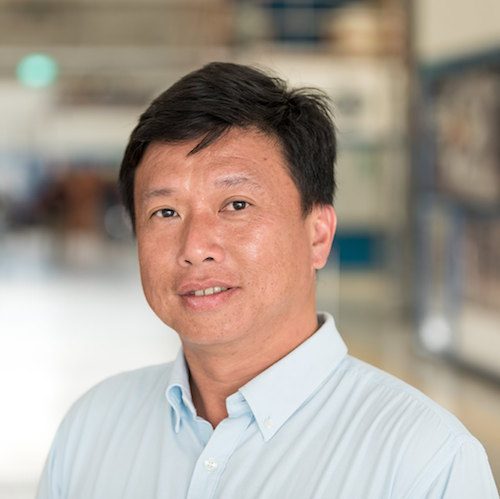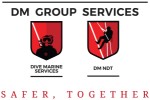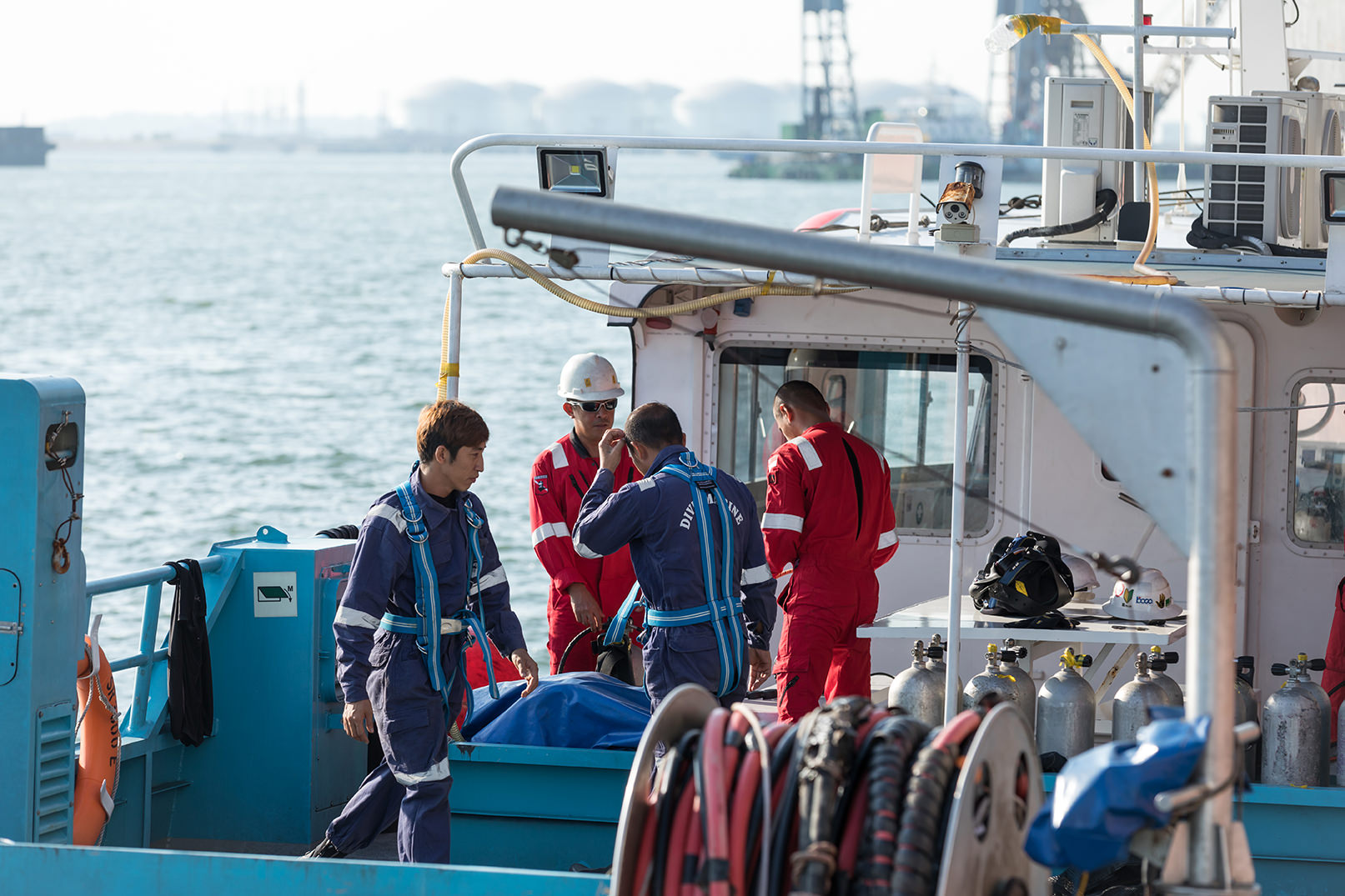SINGAPORE’S UNINVITED SHIP ‘PASSENGERS’
pproximately 100,000 ships pass through Singapore’s 105km-long waterway each year, accounting for about one-quarter of the world’s traded goods, according to Todayonline.com.
Whilst we welcome the vessels, we’re not so happy with the alien invasive species (AIS) that hitch a free one-way ticket to Singapore on the hulls of many ships entering our port.
AIS are non-native microorganisms and algae that cling to ship hulls as they journey to and from Singapore. The adverse effect of these organisms is called biofouling which represents a burden for ship owners and operators by impacting speed, manoeuvrability, operability, and durability of vessels.
The battle against AIS is not limited to vessels owners and operators – it’s also one for marine service companies like DM Group Services who are one of Singapore’s leading specialists in the field of underwater hull cleaning inspection, ship repair and maintenance. Underwater hull cleaning is an essential processes we carry out for ship owners that removes AIS and other accumulated matter from vessels. It is crucial to the efficient performance of vessels which move faster and consume less fuel when they have clean hulls.
Underwater Hull Cleaning aligns perfectly with the growing efforts by the International Maritime Organization (IMO) to reduce greenhouse gas emissions by optimizing fuel efficiency and cutting carbon levels from the atmosphere; port pollution remains the #1 priority for the IMO and here in Singapore, reports spell out the gravity of our own challenge in this respect. AIS and the reduction of harmful emissions is as much a Singapore problem as it is global.
According to research at McGill University in Montreal, Canada, worldwide ship traffic will triple, and possibly increase more than twelvefold, between now and 2050. This surge could also dramatically raise the risk of AIS invasion. As one of the busiest ports in the world, the risks are real; Singapore stands to benefit greatly from this increased ocean traffic, but what can be done to minimise the ecological and environmental problems that AIS may to our waters?
A recent headline in Singapore alarmingly reported, “Mussel Calamity: Shellfish from the Americans carpeting Singapore shores, could mussel out local species”. The Nature Society said the invasive mussels have “devastated” the Kranji mudflats, an ecologically important habitat, and could have a significant negative impact on our growing aquaculture industry which is one of the building blocks of our food security policy. It is believed that these mussels arrived on the hull of a visiting ship, likely from South America. An InvasivesNet study reports that 22 fully marine AIS have already been introduced to our water, with Singapore ranked as one of the most at-risk port sin the world for marine bio-invasions.
AIS are highly democratic – they are geo-neutral, two-way travellers. Our own native species also travel the other way, departing Singapore on vessels bound for the Europe and the Americas. The Asian Green Mussel, native to SE Asia, has shown up in Florida having journeyed on vessels originating here.
The IMO’s ecological and environmental vision has far-reaching implications, including how the shipping sector secures investment and funding from financial institutions; the Poseidon Principles, developed as a sub-set of the IMO’s vision, embeds environmental and sustainability considerations into the financing decisions made by banks etc. In other words, shipping companies with healthy carbon emissions scorecards would be assessed more favourably than those who lag behind. This means regular and more underwater hull cleaning.
UNDERWATER HULL CLEANING – WITH STRINGS ATTACHED
Given these complex interdependencies, how do we meaningfully improve the ‘grooming’ and cleaning of vessels such that we minimise or reduce any negative effects of AIS on our environment. It’s a problem as old as time itself – hull cleaning has been around since as early as 400BC; an Aramaic record dating from 412 B.C. tells of a ship’s bottom being coated with a mixture of arsenic, oil and sulphur to battle micro-creatures, and in fact, that fundamental challenge remains today.
There is no ‘one-size-fits-all’ tech that AIS-proofs the process of underwater hull cleaning, but as a significant operator in this arena, we support a 2-pronged sustainability approach:
- Improved Regulation. Remarkably, there are currently no internationally accepted performance standards for underwater hull cleaning. We have non-binding guidelines from the IMO and the IMO-backed GloFouling Partnership. However, we await the introduction of global standards for IWHC which are currently being drawn up by the Baltic and International Maritime Council (BIMCO) in conjunction with stakeholders including the IMO, paint manufacturers, ship owners and cleaning companies. The proposed new regulations are due any day now. If the entire process of biofoul management is safe and effective, such regulation will be warmly welcomed by DM Group Services.
- Greater Innovation. In getting ahead of the any new regulations, we are turning to innovative partners to ensure we play our part. The MPA and its marine innovation ecosystem does much to nurture public private partnerships, R&D etc. The Straits Times reports that impressive advances have been made at the National University of Singapore’s Tropical Marine Science Institute where environmentally safe anti-fouling materials have been successfully developed. Similar break-throughs are happening around the world.
DM Group Services has always sought out the most innovative tech and maritime collaborators (regionally and internationally) to ensure our capability keeps up with the increasingly complex needs of our customers. We recently partnered with the technology company, Tech Hull Clean (THC) in developing a 4th-generation underwater hull cleaning system to tackle the environmental challenges we face here in Singapore. We have jointly developed a unique cleaning, debris collection and filtration system that’s demonstrating notably superior results in preventing AIS, marine fouling and chemical pollutants from entering the sea. Results from European ports using THC’s technology are impressive, based on empirical data; the level of protection for the local eco-system and the unique debris collection and filtration system are measurably better than we’ve seen before.
THC is now headquartered in Singapore, so we are hands-on in refining this new service which will be launched shortly. This is very good news for us and a win-win for our port and our environment.
There is no magic bullet to fix the legacy problems of pollution generated by our shipping industry. Regulation has been slow and ship owners and operators are primarily driven by keeping costs as low as possible. However, we have more vessels on our seas than at any other point in history and we must face up to the consequences of expecting our environment to continue coping with ship pollution, whether its emissions or AIS.
Underwater hull cleaning is one small maintenance cog in a very large wheel but we believe that we can and will do better. DM Group Services is leveraging innovation, highly skilled and experienced divers and ethical, sustainable services. As regulation improves, we hope this effort will be valued and supported by our colleagues across the shipping community.
Contact us if you have any questions regarding our marine services or visit our website for more information.
Related Articles
Talk To Our Team

Eugene’s responsibilities include business development and performance of the company’s business. He has spear headed the diversification of businesses and developed the various subsidiaries within the Group.


